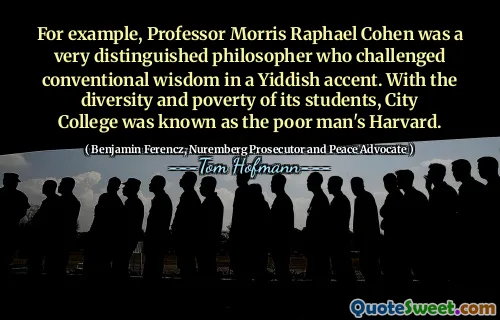Benjamin Ferencz was a prominent figure in international law, known for his role as a chief prosecutor during the Nuremberg Trials, where he held Nazi war criminals accountable for their actions. As the youngest prosecutor at these historic trials, he emphasized the importance of justice and the rule of law in addressing atrocities committed during World War II. His work exemplified a commitment to upholding human rights and the need for a legal framework to prevent such crimes from occurring again.
Beyond his achievements at Nuremberg, Ferencz dedicated his life to advocating for peace and justice globally. He has been a staunch proponent of international law, arguing that nations should resolve conflicts through dialogue rather than violence. His efforts included promoting the establishment of an international criminal court, which he believed was essential for achieving accountability and deterrence against future war crimes.
Ferencz's legacy is marked by his unwavering belief in the power of legal mechanisms to foster peace. He has written extensively about the necessity of an organized approach to addressing war crimes and advocating for a more peaceful world. His lifelong commitment to fighting for justice and the rule of law continues to inspire new generations of legal scholars and peace activists around the globe.
More »
Today Birthdays
1940 -
Arlie Russell Hochschild
1929 -
Martin Luther King, Jr.
1914 -
Etty Hillesum
1908 -
Edward Teller
2004 -
Grace VanderWaal
1984 -
Ben Shapiro
1931 -
Thomas Hoving
1988 -
Skrillex
1963 -
Bruce Schneier
1906 -
Aristotle Onassis
1947 -
Pete Waterman
1850 -
Sofia Kovalevskaya
1979 -
Drew Brees
1941 -
Captain Beefheart
1791 -
Franz Grillparzer
1974 -
Rachel Roy
1960 -
Kelly Asbury
1948 -
Tadashi Shoji
1844 -
Cole Younger
1918 -
Gamal Abdel Nasser
1909 -
Gene Krupa
1893 -
Ivor Novello
1949 -
John Podesta
